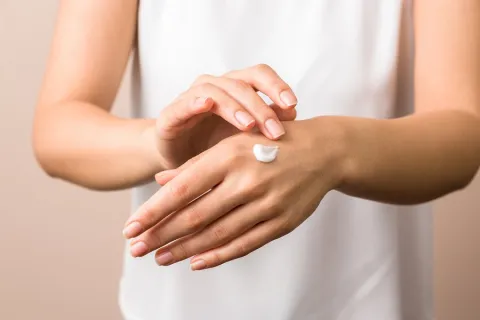Healthy Nails Are at Your Fingertips

Our nails are made of keratin, a hard, strong protein also found in hair and skin, but their rugged appearance doesn’t mean they're invincible. Just like their keratin cousins, our nails need protection and care, or they will split, peel, and chip.
Brittle or splitting nails are more common in women and are most often caused by external factors, but our nutrition and health also impact their condition.
External factors that cause our nails to become brittle, split or peel include:
- Water exposure, including frequent hand washing, preparing food, dishwashing and house cleaning
- Frequent manicures and using a polish remover that contains acetone
- Cutting, pushing or trimming cuticles
- Harsh, dry weather
- Prolonged exposure to cleaning fluids, detergents, etc.
Brittle or ridging of the nails can also be a natural part of aging or a side effect of cancer treatment, especially chemotherapy and other treatments.
When Is it Time to Talk To Your Doctor?
What bothers us most about brittle or chipping nails may be their unsightly appearance, but it's important to understand that fingernail health can indicate something more serious. Here are just a few things brittle nails may be telling you about your health:
- You have an autoimmune or inflammatory disorder, such as psoriasis, lichen planus or alopecia areata.
- You’re suffering from malnutrition, or a protein, iron, or calcium deficiency. Often people with eating disorders have brittle nails. Bulimia or anorexia can deprive the body of B-complex vitamins, iron, calcium and essential dietary oils like omega-3.
- You’re ingesting too much selenium — a mineral found in seafood, muscle meat, organ meat, grains and cereals.
- You have hypothyroidism or low thyroid levels.
- Your cancer medication is causing your nail changes.
If you suspect any of these issues, contact your primary care provider or dermatologist. You’ll also want to contact your health care provider if your nails become brittle suddenly or if any of the following symptoms accompany a decline in fingernail health:
- You’re losing your hair.
- Your fingernails begin to fall off.
- You begin to experience mood swings or confusion.
- You have nausea, vomiting or diarrhea.
If you have no symptoms of more serious conditions, try these DIY approaches to building healthy nails.
Use a Moisturizer for Healthy Nails
- Look for hand lotions and creams that contain lanolin or alpha hydroxy acids for maximum hydration.
- Apply lotion to your hands every time you wash them, and rub it thoroughly into your nails and the skin surrounding them.
- Moisturize your hands, feet and nails before bedtime for overnight healing. You might even consider wearing cotton gloves and socks for extra protection.
Protect Them
- Use rubber gloves when doing household chores to keep hands dry and to minimize contact with detergents and harsh chemicals.
- Once the temperature drops, wear knit or cloth gloves or mittens when you go out to minimize exposure to dry air and other harsh conditions.
- Use alcohol-based hand sanitizers rather than soap and water when possible.
- Stop using your nails to open cans and scrape paint, dried food, etc., off surfaces.
- Don't use your nails to type or text; use the pads of your fingers instead.
- Keep them short. Less nail surface means less exposure to water and chemicals.
- Do not cut, push, or bite cuticles, as these protect the root of the nail and allow for healthy growth.
- Use a nail polish remover that doesn't contain acetone, and avoid using it frequently.
Consider Taking Biotin … Safely
Some people find taking a biotin supplement helps nails become healthier, but it can take six months for the benefits of this B vitamin to become noticeable and can help about one-third of the time. Don’t take biotin if you are pregnant.
Prior to taking biotin, it’s important to speak with your primary care provider and to know the risks of this over-the-counter supplement. Biotin has been shown to interfere with laboratory blood tests, including those necessary for the evaluation of heart and thyroid disease. Tell your primary provider and emergency services personnel that you are taking biotin so that you're not misdiagnosed due to an inaccurate lab value as a result of taking the supplement.
While we all enjoy looking down at our hands and seeing healthy nails, what they indicate about our overall wellness shouldn’t be ignored. If your nails are weak, splitting, and peeling and a little home TLC doesn’t improve their condition, don't hesitate to ask your health care provider for a helping hand.
Related: How Diet Affects Your Skin Tactics To Stave Off Signs of Aging Skin
Other related articles by:
alpha hydroxy acids | anorexia | autoimmune disease | biotin | brittle | fingernails | healthy nails | women's healthNote: The content of this blog is for informational purposes only. It is not intended for use as diagnosis or treatment of a health problem or as a substitute for the professional consultation of a physician or qualified health care provider. If you have specific questions or concerns regarding a health or medical condition, contact your physician or a licensed health care professional.

